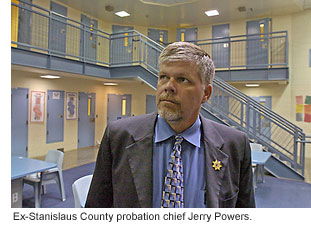At probation, the new powers that be
October 26, 2011
 Jerry Powers could have predicted as much. The first paragraph of the Los Angeles Daily News story announcing his hiring Tuesday by the Board of Supervisors began with the phrase, “Los Angeles County’s troubled Probation Department has a new chief.”
Jerry Powers could have predicted as much. The first paragraph of the Los Angeles Daily News story announcing his hiring Tuesday by the Board of Supervisors began with the phrase, “Los Angeles County’s troubled Probation Department has a new chief.”
“Every news report, it’s the same thing, ‘troubled, troubled, troubled,” Powers was saying just the other day. “I was joking with the board that my cards will have my name, title and ‘Troubled L.A. County Probation Department.’ ”
Powers, of course, knows that reporters are unlikely to abandon the descriptive shorthand until he gives them a new story line, a daunting challenge for an agency that has, among many other things, come under intense Justice Department scrutiny for failures in its juvenile camps, severe budgeting lapses and considerable churn at the top. Powers’ predecessor is leaving after only 18 months on the job.
“We’ve got some flaws, and some work to do,” Powers acknowledges. “That’s been well documented. But I’m convinced we can fix that. This department can be a leader in the field again.”
Powers, who’ll begin work on December 5 and earn an annual salary of $255,000, is likely to experience some culture shock, not only because of the enormity of the issues confronting the department but because of its sheer bulk.
He’ll arrive here after a well respected career in Stanislaus Countyin the northern Central Valley, where he’s been chief probation officer since 2002. There, the department’s 250 employees oversee 7,000 adults and 900 juveniles. Its budget is $25 million.
Those numbers, however, represent a fraction of what Powers will confront inLos AngelesCounty, where 6,200 staffers supervise more than 50,000 adults and 20,000 juveniles. Its budget is $716 million.
What’s more, no probation department in Californiawill feel a greater impact from the state’s new criminal justice “realignment” law, which transfers to the counties the responsibility of supervising newly-released prison inmates who’d been serving sentences for non-violent, non-serious, non-sexual crimes.
In Los Angeles County, these paroled inmates—many with prior histories of serious and violent crimes—are predicted to number 9,000 by June.
Asked how he’ll make the adjustment from a relatively small operation to such a huge one, Powers says “that’s the No. 1 question.” But he’s convinced “it’s strictly a leadership issue,” whether you’re responsible for 250 employees or 2,500. And that means “being visible, holding people accountable and putting people in the right places to succeed.”
Powers, who is president of California’s association of probation chiefs—and was a reported finalist to become Stanislaus County’s chief executive officer until taking the L.A. job—describes himself as a “collaborative” and “flexible” leader, “who’s pretty sure about what I want and what I don’t want.”
“But at the end of the day,” he says, “I’m ultimately responsible, and we’re [the staff] going to move in the same direction. And if you’re not interested in pulling in the same direction, then we’ll get people who are. The vast majority of people here do not want to work for a ‘troubled’ department. They want to be proud of who they work for and know that what they do is of value to the community.”
Posted 10/26/11












 405 bridge work causes a stink
405 bridge work causes a stink
